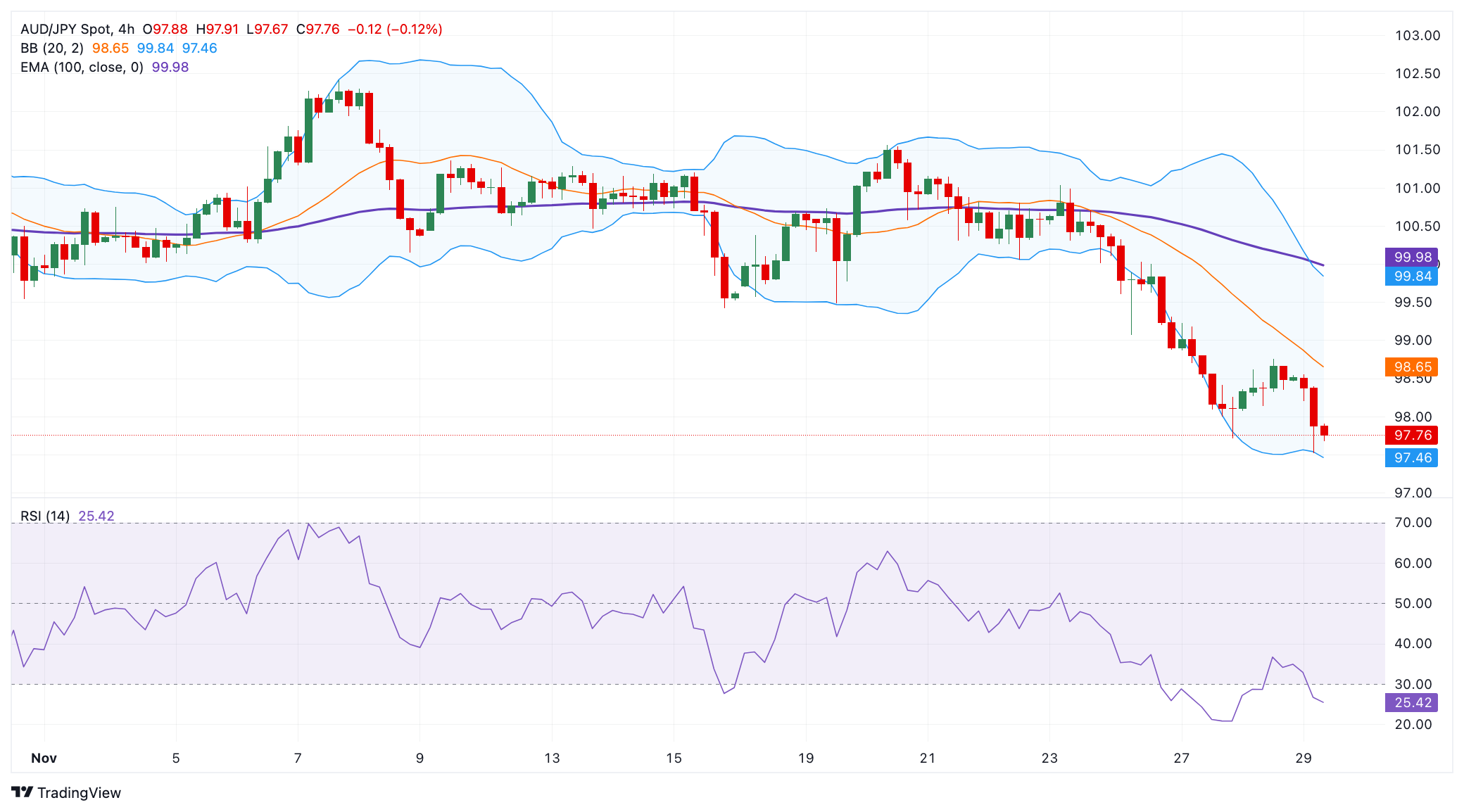- Phân tích
- Tin tức và các công cụ
- Tin tức thị trường
- AUD/JPY Price Forecast: Remains under selling pressure below 98.00, oversold RSI condition eyed
AUD/JPY Price Forecast: Remains under selling pressure below 98.00, oversold RSI condition eyed
- AUD/JPY tumbles to near 97.75 in Friday’s early European session, losing 0.73% on the day.
- The negative outlook of the cross remains in play, but further consolidation cannot be ruled out amid oversold RSI condition.
- The first downside target to watch is 97.45; the immediate resistance level is seen at 98.76.
The AUD/JPY cross attracts some sellers to around 97.75 during the early European trading hours on Friday. The Japanese Yen (JPY) gains momentum after data released on Friday showed that Japan’s Tokyp Consumer Price Index (CPI) accelerated for the first time in three months, supporting the case for another interest rate hike by the Bank of Japan (BoJ) in December.
According to the 4-hour chart, the bearish sentiment of AUD/JPY remains intact as the cross holds below the key 100-period Exponential Moving Average (EMA). The downward momentum is supported by the Relative Strength Index (RSI), which stands below the midline. Nonetheless, the oversold RSI condition indicates that further consolidation cannot be ruled out before positioning for any near-term AUD/JPY depreciation.
The initial support level for the cross emerges near the lower limit of the Bollinger Band at 97.45. Further south, the next contention level is seen at 96.60, the low of September 4. The additional downside filter to watch is 96.00, the low of September 19 and the psychological level.
On the bright side, the first upside barrier for the cross is located at 98.76, the high of November 28. Any follow-through buying above this level could pave the way to the 99.00 round mark. Further north, the next hurdle is seen at 99.49, the low of November 19. The 100.00 psychological appears to be a tough nut to crack for the bulls.
AUD/JPY 4-hour chart
Japanese Yen FAQs
The Japanese Yen (JPY) is one of the world’s most traded currencies. Its value is broadly determined by the performance of the Japanese economy, but more specifically by the Bank of Japan’s policy, the differential between Japanese and US bond yields, or risk sentiment among traders, among other factors.
One of the Bank of Japan’s mandates is currency control, so its moves are key for the Yen. The BoJ has directly intervened in currency markets sometimes, generally to lower the value of the Yen, although it refrains from doing it often due to political concerns of its main trading partners. The BoJ ultra-loose monetary policy between 2013 and 2024 caused the Yen to depreciate against its main currency peers due to an increasing policy divergence between the Bank of Japan and other main central banks. More recently, the gradually unwinding of this ultra-loose policy has given some support to the Yen.
Over the last decade, the BoJ’s stance of sticking to ultra-loose monetary policy has led to a widening policy divergence with other central banks, particularly with the US Federal Reserve. This supported a widening of the differential between the 10-year US and Japanese bonds, which favored the US Dollar against the Japanese Yen. The BoJ decision in 2024 to gradually abandon the ultra-loose policy, coupled with interest-rate cuts in other major central banks, is narrowing this differential.
The Japanese Yen is often seen as a safe-haven investment. This means that in times of market stress, investors are more likely to put their money in the Japanese currency due to its supposed reliability and stability. Turbulent times are likely to strengthen the Yen’s value against other currencies seen as more risky to invest in.
© 2000-2026. Bản quyền Teletrade.
Trang web này được quản lý bởi Teletrade D.J. LLC 2351 LLC 2022 (Euro House, Richmond Hill Road, Kingstown, VC0100, St. Vincent and the Grenadines).
Thông tin trên trang web không phải là cơ sở để đưa ra quyết định đầu tư và chỉ được cung cấp cho mục đích làm quen.
Giao dịch trên thị trường tài chính (đặc biệt là giao dịch sử dụng các công cụ biên) mở ra những cơ hội lớn và tạo điều kiện cho các nhà đầu tư sẵn sàng mạo hiểm để thu lợi nhuận, tuy nhiên nó mang trong mình nguy cơ rủi ro khá cao. Chính vì vậy trước khi tiến hành giao dịch cần phải xem xét mọi mặt vấn đề chấp nhận tiến hành giao dịch cụ thể xét theo quan điểm của nguồn lực tài chính sẵn có và mức độ am hiểu thị trường tài chính.
Sử dụng thông tin: sử dụng toàn bộ hay riêng biệt các dữ liệu trên trang web của công ty TeleTrade như một nguồn cung cấp thông tin nhất định. Việc sử dụng tư liệu từ trang web cần kèm theo liên kết đến trang teletrade.vn. Việc tự động thu thập số liệu cũng như thông tin từ trang web TeleTrade đều không được phép.
Xin vui lòng liên hệ với pr@teletrade.global nếu có câu hỏi.
















